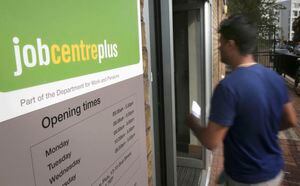Big falls in number of people out of work in the West Midlands
Latest unemployment figures brought good news to the West Midlands, revealing the number of people out of work had dropped by 17,000 with 2.7 million now in work across the region.

The figures, from the Office for National Statistics (ONS) showed unemployment in the West Midlands in the three months to August was down to 149,000.
Nationwide unemployment has fallen to a 12-year low but pay growth continues to fall behind inflation.
The UK jobless total was cut by 52,000 in the quarter to August to 1.4 million, the lowest since 2005, with women driving the growth in employment.
More than 32 million people are in work after a rise of 52,000, including 15 million women, with the female employment rate reaching a record 70.7%, the Office for National Statistics reported.
Average earnings increased by 2.2% in the year to August, unchanged from the previous month, but the gap between earnings and the cost of living has widened after new figures this week showed RPI inflation had risen to 3.9% and CPI inflation to 3%.
ONS statistician Matt Hughes said: "Many labour market measures continue to strengthen.
"Employment growth in the latest three-month period was driven mainly by women, with a corresponding drop in inactivity.
"Vacancies remain robust, at a near-record level.
"On the other hand, total earnings in cash terms grew slower than prices over the last year, meaning the real value continues to fall - down 0.3% over that period."
The claimant count, which includes people on Jobseekers Allowance and the unemployment element of Universal Credit, increased by 1,700 last month to 804,000. The figures differ because not everyone classed as unemployed is eligible to claim benefit.
Across the West Midlands the claimant count in September was up 240 to 85,915. But there was a mixed picture locally.
In Wolverhampton the claimant count was down 20 to 6,720, or 4.2 per cent of the city's working population. In Dudley, however, it rose by 110 to 5,880, or three per cent. In Sandwell the count was up by 50 to 7,065, or 3.5 per cent, while it remained steady at 4,885 in Walsall, at 2.9 per cent.
In Staffordshire the number of people claiming unemployment related benefits was down by 95 to 5,485, or just one per cent. In Cannock Chase it held at 780,while in Lichfield it was also steady at 455. In South Staffordshire the claimant count fell by 30 to 765 and in Stafford it was down by 15 to 730.
In Kidderminster and Wyre Forest, however, the count rose by 10 to 760 last month.
Employment minister Damian Hinds said: "Our economy is helping to create full time, permanent jobs which are giving people across the UK the chance of securing a reliable income.
"We've boosted the income for people on the lowest pay by increasing the national living wage and delivered the fastest pay rise for the lowest earners in 20 years.
"That's great progress and we're determined to help more people flourish in the world of work.
"For example we've launched our new returnship programme to help more women get into good jobs after taking time out, and to keep their career progressing."
TUC general secretary Frances O'Grady said: "Pay packets are taking a hammering. This is the sixth month in a row that prices have risen faster than wages.
"Britain desperately needs a pay rise. Working people are earning less today in real-terms than a decade ago.
"The Chancellor must help struggling families when he gives his Budget next month.
"This means ditching the artificial pay restrictions on nurses, midwives and other public sector workers and investing in jobs that people can live on."
At industry body the CBI, head of employment Matthew Percival said: “Persistently weak productivity, coupled with falling real wages, continues to hit living standards, underlining the need for the Chancellor to bold in his Budget.
“Delivering urgent progress on large and small infrastructure projects, addressing underfunding in education and providing practical support for innovators are all steps the Government can take as part of a meaningful Industrial Strategy to boost productivity, the only sustainable route to improving people’s pay.”





